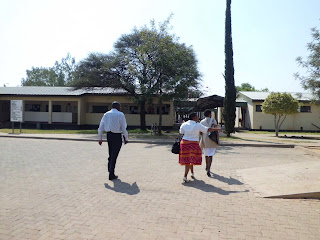Here's a little background on what I'm hoping to do this year if you're interested: My project will involve scoring patients who come into the Emergency Department with pneumonia. I'm hoping that a simple scoring system that works in the US in HIV-negative populations, can be used here in HIV+ patients to help triage those who need to be admitted to the hospital and those who can safely be sent home.
My first task was to spend a day in the ER (here called A&E for Accident and Emergency) to get a sense of the patient flow...or lack thereof. The head of A&E is actually an American doctor who's been working here for 3 years and has made huge strides in the department, including introducing seemingly obvious things like a triage board. I joined him yesterday afternoon and proceeded to sprint around the A&E after him until utter exhaustion. The first patient we saw was a 3 yr old girl who had sudden right-sided paralysis and inability to speak. She was in room C1 (corridor 1), meaning she was on one of the three stretchers in the main hallway amid all the traffic. She was lying on her side in a tense, crooked position on the stretcher at 4pm when I arrived, and she was in the same position in the same spot when I left at 10pm. I could be incredibly frustrated by this, and I am, but frankly, after also spending time on the inpatient wards, I do not think a speedy admission would have improved her care very much.
Next I wanted to get the hang of enrolling patients in research studies, so this morning I joined another research team's study nurses on an outreach mission to enroll patients. They enroll newly diagnosed HIV+ patients and take blood samples at different time points after starting HAART (Highly Active Anti-Retroviral Therapy). We went to a few local clinics toting a small cooler for the blood samples, and I basically stood quietly for many hours while they filled out surveys with patients in Setswana. I learned three things: 1) You cannot make any generalizations about who gets HIV here. It's everyone. 2) There is no such thing as patient privacy. The nurses took disease histories, sexual histories, everything, in a room with all the other patients listening in. 3) I need to learn Setswana.
I had barely gotten out of the car at the UPenn office when the sassy study nurses from my team snatched me up into their car to go on another outreach mission. I thought we were going down the road...Nope! We drove 1.5 hrs through miles and miles of flat farmland, dodging goats, until we got to a primary hospital that starts with a "p", but I am so bad at remembering these crazy long names, so I will get back to you. Hospitals here are organized into primary, district, and referral hospitals. Princess Marina, where I will be enrolling, is a referral hospital, which basically means that it has some modern medical equipment (like automatic blood pressure cuffs) and "specialists" (like pediatricians).
Anyway, at the primary hospital today, Susan and Mama Molapisi (in the pic walking into the hospital) were leading a focus group of nurses to get feedback on a newly drafted guideline for
 Botswana for the management of acute coronary syndromes (heart attacks). I was so proud to be joining this team after seeing how fierce and brilliant these ladies were at mobilizing this focus group. Susan gave a beautiful and inspiring speech about the nurses standing up for themselves and demanding a higher standard of care. It was pretty shocking when the first nurse finally spoke up and said, "I don't think t
Botswana for the management of acute coronary syndromes (heart attacks). I was so proud to be joining this team after seeing how fierce and brilliant these ladies were at mobilizing this focus group. Susan gave a beautiful and inspiring speech about the nurses standing up for themselves and demanding a higher standard of care. It was pretty shocking when the first nurse finally spoke up and said, "I don't think t his guideline will work, because it all depends on having an ECG machine, and we have never had one." It later came out that they also do not have anticoagulation, or a lab. And yet it still called itself a hospital. For the non-medical people, that basically means if someone comes to that hospital having a heart attack, all they get is an aspirin. I can totally sense my parents' fear right now. Yep, pretty scary.
his guideline will work, because it all depends on having an ECG machine, and we have never had one." It later came out that they also do not have anticoagulation, or a lab. And yet it still called itself a hospital. For the non-medical people, that basically means if someone comes to that hospital having a heart attack, all they get is an aspirin. I can totally sense my parents' fear right now. Yep, pretty scary.Anyway, that's just the tip of the iceberg. It's going to be a fascinating year. Right now I am just ready for a weekend.
No comments:
Post a Comment